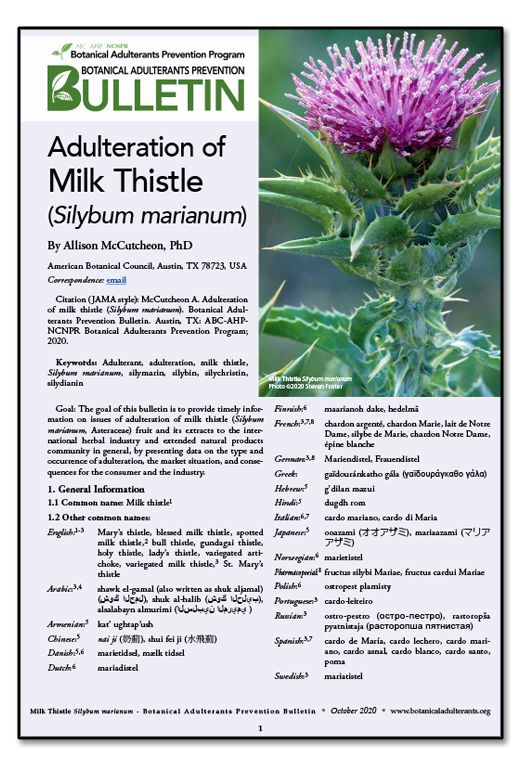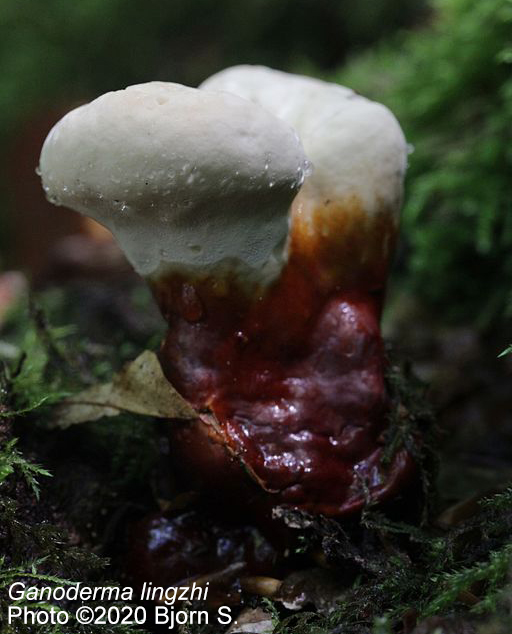|
|
|
|
|
| |
 |
Dear Reader
Once again, we put a spotlight on authenticity issues in this newsletter and feature a selection of different analytical approaches to determine the authenticity of herbal ingredients. Issue # 21 includes data on commercial dietary supplement products obtained by microscopy, DNA barcoding, high-performance thin-layer chromatography (HPTLC), high-performance liquid chromatography with UV detection (HPLC-UV), carbon isotope mass spectrometry, and proton nuclear magnetic resonance (1H NMR) spectroscopy. It shows that the verification of herbal ingredient identity is not a trivial matter, and that in many cases, as we have often emphasized, the use of a number of orthogonal methods is necessary to have a robust quality control protocol.
... MORE
 |
|
Stefan Gafner, PhD
Chief Science Officer, ABC
Technical Director, ABC-AHP-NCNPR Botanical Adulterants Program |
|
| |

ABC-AHP-NCNPR Botanical Adulterants Prevention Program
Recent News
|
Milk Thistle Fruit Extract Botanical Adulterants Prevention Bulletin Published
The ABC-AHP-NCNPR Botanical Adulterants prevention Program has published a new bulletin on the adulteration of milk thistle fruit extracts.Dietary supplements made from the extracts of milk thistle fruit are widely used by consumers for the supportive treatment of the liver such as alcohol- or drug-induced hepatitis and cirrhosis, and treatment of dyspepsia and gallstones. The therapeutic benefits of these extracts result from their silymarin content. Silymarin is a collective term denoting a mixture of chemicals known as flavonolignans. Silymarin content standardization is well defined in official monographs for milk thistle extracts such as those published in European and US pharmacopeias.
... MORE

|
ABC-AHP-NCNPR Botanical Adulterants Prevention Program Welcomes New Supporters and Underwriters
The ABC-AHP-NCNPR Botanical Adulterants Prevention Program is grateful to the following companies that have recently committed to financially underwriting the Program:
- Canadian Analytical Laboratories
|
|
| |
Regulatory Alerts
Data on Adulteration of Amla Fruit Extracts Sent to FDA and FT
Extracts of the fruit of amla (Phyllanthus emblica, syn. Emblica officinalis, Phyllanthaceae) have a long-standing use in traditional systems of Indian medicine to reduce inflammatory conditions of the digestive system, to assist with constipation, and to strengthen the heart.1 The fruit is also known for its vitamin C content, which ranges between 0.2 – 1.3%, depending on the fruit material (including where grown, etc.), processing method, and the analytical test.
...MORE
|
| |
Industry Alerts
Evidence for Adulteration of Turmeric Extracts with Synthetic Curcumin
Details of the investigation into the authenticity of 14 turmeric (Curcuma longa, Zingiberaceae) dietary supplements randomly purchased on the internet were presented by Len Monheit, Executive Director of the Global Curcumin Association (GCA), during a webinar on December 3, 2020. The commercial samples were analyzed for curcuminoid contents according to the HPLC-UV method for turmeric extracts described in the United States Pharmacopeia and for contents in non-biobased curcumin by 14C isotope mass spectrometry.
...MORE
|
| |
Previous Issues of “Botanical Adulterants Monitor”
Available here. |
|
Science Update
Authentication of Rhodiola Roots and Root Extracts by HPTLC
Reviewed: Khokhlova K, Zdoryk O. Authentication of Rhodiola rosea, Rhodiola quadrifida and Rhodiola rosea liquid extract from the Ukrainian market using HPTLC chromatographic profiles. Nat Prod Res. 2020; 34(19):2842-2846..
... MORE
NMR Analysis of Commercial Passionflower Herb Extracts Sold on the Brazilian Market
Reviewed: Flores IS, Martinelli BCB, Lião LM. High-resolution magic angle spinning nuclear magnetic resonance (HR-MAS NMR) as a tool in the determination of biomarkers of Passiflora-based herbal medicines. Fitoterapia. 2020;142:10450 .
... MORE
1H-NMR Study of Cinnamon Spice and Food Supplements from French Markets
Reviewed: Wu N. Low-field NMR for quality control and fraud detection: application to the analysis of dietary supplements and e-liquids. PhD Thesis. Université Paul Sabatier – Toulouse III, 2020. NNT : 2020TOU30044.
... MORE
Commercial Reishi Supplements Sold in the United States Identified as Ganoderma lingzhi by DNA Barcoding
Reviewed: Gunnels T, Creswell M, McFerrin J, Whittall JB. The ITS region provides a reliable DNA barcode for identifying reishi/lingzhi (Ganoderma) from herbal supplements. PLoS One. 2020 15(11): e0236774.
... MORE

Review on the Usefulness of Botanical Microscopy to Detect Herbal Ingredient Adulteration
Reviewed: Ichim MC, Häser A, Nick P. Microscopic authentication of commercial herbal products in the globalized market: Potential and Limitations. Front Pharmacol. 2020;11:876
...MORE
|
| |
Useful Links and Resources
For more information and updates on the work of the three partner organizations of the ABC-AHP-NCNPR Botanical Adulterants Program, please visit ABC at www.herbalgram.org, AHP at www.herbal-ahp.org, and NCNPR at www.pharmacy.olemiss.edu/ncnpr.
Other Helpful Resources and Links
... MORE
|
| |
Upcoming Events
Below are descriptions and links to some of the upcoming conferences, seminars, and workshops that may be of interest to learn more on adulteration and related quality control issues. Please note that due to the COVID-19 pandemic, conferences may be postponed or cancelled. For a more extensive listing of botanical and phytomedicinal conferences, webinars, and related educational events, please check the American Botanical Council Calendar of Events.
20th International Conference on the Science of Botanicals
Oxford, MS: August 9th – 12th, 2021
Attended by members of CFSAN/FDA, government officials, academic researchers, major trade associations and industry representatives, the conference will cover approaches for post-market surveillance, risk and safety assessment, quality control and adverse event reporting for botanical dietary supplements (BDS), as well as regulatory aspects and other pressing topics that affect BDSs and their impact on consumers. While the 2021 meeting dates have been announced, details on the program are still lacking and it is difficult to know the landscape of traveling if the COVID-19 pandemic is not brought under control.
For more information: http://www.oxfordicsb.org/
|
|
| |
About the
|
 |
The ABC-AHP-NCNPR Botanical Adulterants Program is a consortium of independent nonprofit organizations whose mission relates to education, scientific research, and quality of botanical dietary ingredients and related plant-derived materials. The consortium is headed by three nonprofit groups dealing with education and research on medicinal herbs and other beneficial plants: the American Botanical Council, the American Herbal Pharmacopoeia, and the National Center for Natural Products Research at the University of Mississippi. The program is underwritten or endorsed by more than 130 natural products industry companies, independent analytical laboratories, contract research organizations, nonprofit and professional organizations, trade associations, accredited institutions of education in natural medicine, law firms, and media companies that are involved in the production, supply, manufacture, distribution, marketing, analysis, research, and/or education of herbal dietary ingredients and supplements, in the United States and internationally. All publications of the Program are available free-access on its homepage including the “Botanical Adulterants Monitor,” an e-newsletter that conveys Program news, regulatory updates, and recent scientific publications related to adulteration, contamination, identity, and authenticity of botanical raw materials, extracts, and essential oils. Companies, organizations, foundations, and/or individuals interested in supporting this program are invited to contact Ms. Denise Meikel, ABC Development Director, at (512) 926-4900, ext. 120, or by email.
|
| |
Underwriters and Supporters of the ABC-AHP-NCNPR Botanical Adulterants Prevention Program (as of December 21, 2020)**
**The following companies, organizations, and institutions are currently underwriting/endorsing and/or have underwritten and/or endorsed BAPP. By acknowledging the generous support of these companies and organizations, ABC, AHP, and NCNPR are not endorsing any ingredients, products, or services that may be produced or marketed by them.
|
   |
Update Your Email Preferences | Unsubscribe |
|
|
|
|
|
|
|